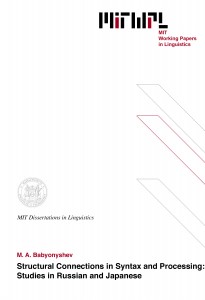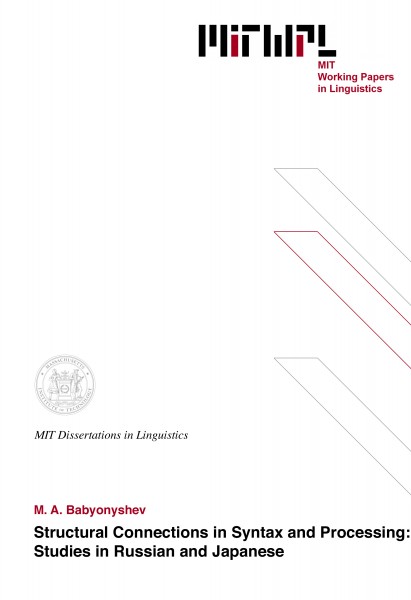Structural Connections in Syntax and Processing: Studies in Russian and Japanese
M. A. Babyonyshev, 1996
This thesis consists of two parts. Part I provides an analysiss of the locative inversion construction, the conjunction agreement construction, and the genitive of negation construction in Russian. These constructions are argues to share one formal property: they contain an element other than the highest nominal argument satisfying the Extended Projection Principle. The EPP is shown to be independent not only of morphological features (such as Case or agreement), but also of categorical features (such as N or D); movement to the EPP position is shown to be subject to the Minimal Link Condition for all categories, so that non-canonical subjects can move to the EPP position only when they are as “close” to it as the highest NP argument. Given our assumptions about VP structure, this happens only in sentences containing unaccusative verbs. The syntactic properties of locative inversion, conjunction agreement, and genitive of negation are shown to follow from the manner in which various general principles of Russian syntax, such as the discourse principles, the properties of covert (as opposed to overt) feature checking, the morphological Case system of Russian, the existential closure applying to all VP-internal positions in overt syntax
Part II investigates the processing complexity of unambiguous Japanese sentences. The investigation utilizes the theory of processing complexity developed in Gibson and Thomas (1996a), within which the memory cost associated with an incomplete syntactic dependency increases as a function of the number of lexical items that are processed between the point where the relationship is posited and the point where it is satisfied. Two types of processing complexity contrasts found in Japanese are discussed: those associated with the number of “stacked” sentence-initial NPs and those associated with the degree and type of center-embedding present in a sentence. Both experimental and intuitive data are provided as evidence for the existence of the complexity contrasts. It is shown that the contrasts are accounted for within the Locality Theory of Gibson & Thomas. On a more general level, this work describes the properties that any theory of processing complexity must have to successfully deal with the available Japanese data and offers a constrained and principled explanation of apparent variation in the processing complexity of similar structures across languages.
Thesis supervisors: Dr. David Pesetsky and Dr. Edward Gibson
Table of Contents
Part I: Syntax
Chapter 1 Introduction 7
Chapter 2 The Extended Projection Principle in Russian 13
1 The Structure of a Russian Sentence 13
2 Does the EPP Operate in Russian? 21
3 What Categories can Satisfy the EPP? 32
4 The Interpretation of the EPP element 46
Chapter 3 The Minimal Link Condition and the EPP element: Conjunction
Agreement in Russian 58
1 The Distribution of Conjunction Agreement 59
2 An Analysis of Conjunction Agreement 75
3 An Explanation of the Distribution of Conjunction Agreement 89
Chapter 4 The Genitive of Negation 101
1 A Description 101
2 Genitive Case in Morphology and Syntax 112
2.1 The Framework 113
2.2 The Decomposition of Abstract Cases 117
2.3 An Analysis of the Syncretic Accusative 121
2.4 Environments of Impoverishment: A Speculation 135
3 The Syntactic Analysis of the Genitive of Negation 139
3.1 The Genitive of Negation and Object Shift Patterns 139
3.2 An Analysis of the Genitive of Negation 147
3.3 An Explanation of the Distribution of the Genitive of
Negation 159
4 Residual Properties of the Genitive of Negation 168

